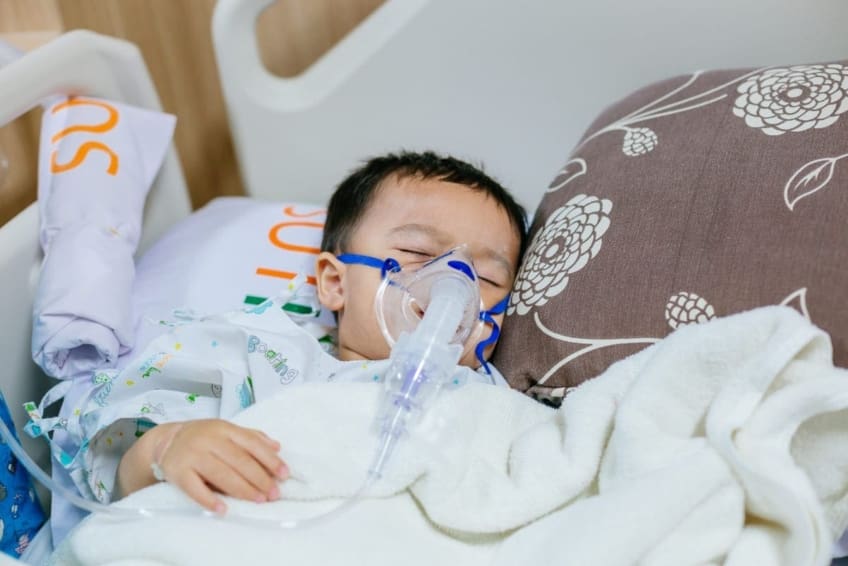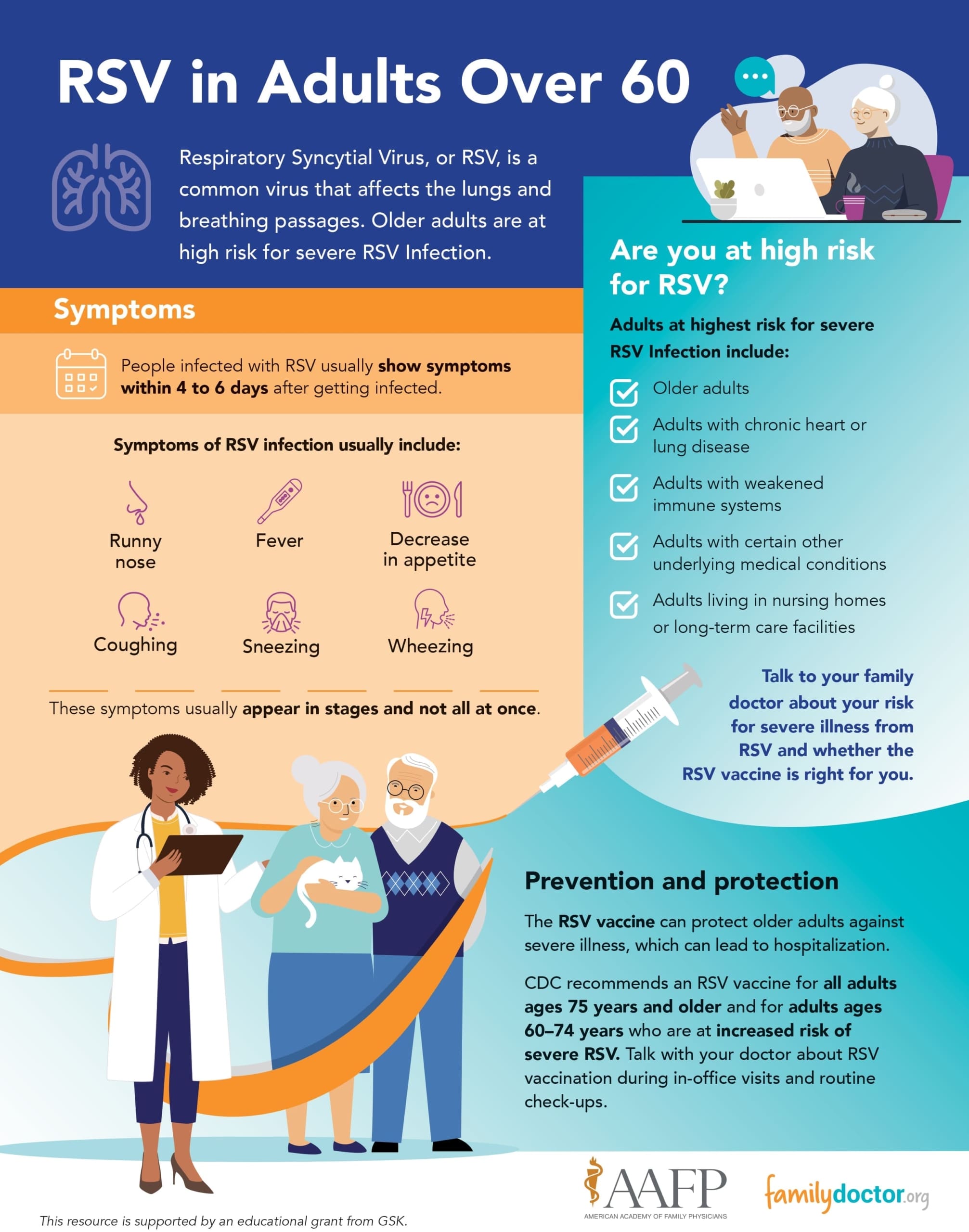
What is RSV?
Respiratory syncytial virus (RSV) is a common virus that affects your lungs and makes it difficult to breathe. The virus is common in children under 2, however, people of all ages can get it. It is more serious for young and premature babies and older adults with poor health. Adults over 60 with heart and lung disease are at a particularly higher risk for getting the virus.
RSV is common in the spring and fall. Unfortunately, you can get the virus more than once in your lifetime.
Certain risk factors make young babies more likely to catch RSV. These include:
- Being underweight
- Congenital heart disease
- Weakened immune system (your body cannot fight infections)
- Lung disease
- Premature birth
- Neuromuscular disease (muscular dystrophy)
- Exposure to tobacco smoke while in the mother’s womb
Symptoms of RSV
Respiratory syncytial virus symptoms are different based on age. Older children and healthy adults have mild, cold-like symptoms. This includes a cough, stuffy nose, and low fever. Symptoms appear 4 to 6 days after catching the virus.
Infants (less than 1 year old), premature babies, and adults who are older than 60 with lung and heart disease have more serious symptoms. These can include:
- Runny nose
- Poor appetite
- Coughing
- Fever
- Sneezing
- Irritability (in babies)
- Trouble breathing (shortness of breath, wheezing, rapid breathing)
- Flaring nostrils as you breathe
- Bluish skin (due to lack of oxygen)
More serious infections can lead to:
- Pneumonia
- Bronchiolitis (lung inflammation)
What causes RSV?
RSV is a virus caused by a common germ found in lung infections. Children under the age of 2 typically get the infection. It is spread through sneezing, coughing, sharing food, cups, eating utensils, touching used tissues, and kissing a person with the virus. Touching your nose and mouth after coming into contact with an infected person can also spread the virus. RSV spreads quickly in crowded areas such as daycare centers, schools, and crowded living conditions (college dorms).
How is RSV diagnosed?
First, your doctor will do a physical exam and use a stethoscope to listen to your lungs. Your doctor will also ask you about your medical history and your exposure to public areas. Next, your doctor may perform additional tests to detect respiratory syncytial virus, including a rapid lab test (swabbing your nose), a chest X-ray (to check for pneumonia), and a blood test to check for dehydration. Your young baby’s doctor may order additional blood or urine tests for serious infections. Serious cases of the illness may require admission to the hospital.
Can RSV be prevented or avoided?
The FDA approved the RSV vaccine in May 2023. The new vaccines are now available.
The AAFP recommends:
- Infants younger than age 8 months born during or entering their first RSV season (typically fall through spring) are recommended to receive one dose of nirsevimab (50 mg for infants who weigh less than 5 kg and 100 mg for infants who weigh 5 kg or greater).
- Children ages 8 to 19 months who are at increased risk for severe RSV disease and entering their second RSV season are recommended to receive one 200-mg dose of nirsevimab.
- Women who are pregnant are recommended to receive a single dose Abrysvo (a vaccine manufactured by Pfizer, Inc.) between 32 and 36 weeks into their pregnancy. This will provide infants a measure of defense in the first few months of life when they are most vulnerable to severe disease.
The CDC recommends an RSV vaccine for all adults ages 75 years and older and for adults ages 60–74 years who are at increased risk of severe RSV. Conditions that increase your risk for severe illness include:
- Chronic heart or lung disease
- Weakened immune system
- Certain other medical conditions, including some people with diabetes and some people with obesity
- Living in a nursing home

Reduce your risk of getting the virus by following these tips:
- Wash your hands with soap, frequently.
- Don’t go to work, school, or public places if you are sick. Stay home instead. RSV spreads quickly in large crowds.
- Cover your mouth and nose with your elbow when you sneeze or cough. Don’t use your hands.
- Don’t share food, drinks, or eating utensils.
- Don’t kiss.
- Don’t share or touch used tissues.
- Don’t shake hands.
- Don’t touch a baby as long as you are sick.
- Wash your eating utensils with hot, soapy water.
RSV treatment
RSV cannot be treated with an antibiotic since antibiotics do not work on viruses. A mild case of RSV will go away after 2 weeks if untreated. However, young babies and older people who have a serious case of the virus may be admitted into the hospital. Hospital patients may need oxygen, moist air through a facemask, and intravenous (IV) fluids. In rare, but life-threatening cases, a patient may need a ventilator (a machine to help you breathe).
The medicine Synagis (palivizumab) has been approved for the prevention of RSV in children under 2. This medicine is for children who are at high risk. Talk to your doctor about this medicine.
Living with RSV
A mild case of respiratory syncytial virus is like having a cold for 2 weeks. Those who have to be hospitalized will experience more discomfort (difficulty breathing). Generally, most people who have RSV fully recover. However, there is a risk for longer-term lung damage, especially for people who had RSV as infants.
Questions to ask your doctor
- Is RSV fatal in young and premature babies?
- Can a baby get RSV more than once?
- Are over-the-counter cold medicines helpful?
- How long should I wait to take my premature baby out in public?
- Are older people in assisted living at higher risk of getting RSV?
Resources
Centers for Disease Control and Prevention: Respiratory Syncytial Virus Infection (RSV)
National Institutes of Health, MedlinePlus: Respiratory syncytial virus (RSV)
![]()
Copyright © American Academy of Family Physicians
This information provides a general overview and may not apply to everyone. Talk to your family doctor to find out if this information applies to you and to get more information on this subject.



